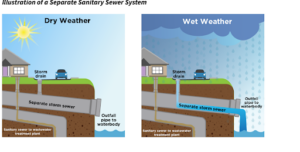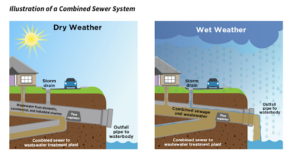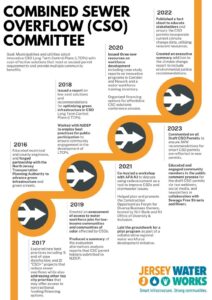10-Year Reflection on Combined Sewer Overflows (CSOs)
Left: Sewage overflow warning sign in Jersey City. Right: Sewage overflow outfall in Perth Amboy. Photo courtesy of New Jersey Future.
INTRODUCTION
The urgent concern for Jersey Water Works (JWW) members has been finding long-term solutions for combined sewer overflows (CSO) in New Jersey. In the past decade, members have worked to increase visibility and tackle CSO challenges through collaborative efforts advocating for the adoption of innovative CSO Long Term Control Plans (LTCPs) that offer cost-effective solutions and multiple community benefits. In 2013, the New Jersey Department of Environmental Protection (NJDEP) signaled its intention to require communities to upgrade their combined sewer systems, leading to collaborative efforts and research to address forthcoming permits for cities with combined sewer systems. The formation of JWW as a collective impact collaborative and the establishment of an active peer-to-peer CSO Network in 2015 and 2016, respectively, marked significant progress. These efforts have included hosting events, sharing resources, influencing thoughts on water infrastructure, designing integrated sewer solutions, and launching case studies and research. JWW has been instrumental in building bridges between stakeholders, advocating for green infrastructure, and promoting CSO solutions. Did all this work make a difference? The mini-report summarizes the actions taken by the CSO committee and highlights the engagement of JWW members in influencing decision-making.
WHAT ARE COMBINED SEWER OVERFLOWS?
In 2024, despite recent advancements, there are 21 municipalities in New Jersey with combined sewer overflows (CSOs). The US Environmental Protection Agency (EPA) explains that “in a combined sewer system, both wastewater and stormwater flow through the same pipes. In dry weather, all wastewater flows to a wastewater treatment plant, where it is treated before being discharged into a water body. However, during wet weather, stormwater also enters the system. The combined flow of wastewater and stormwater can overwhelm the system. Permitted outfalls are located throughout the system to act as relief points during wet weather. These outfalls discharge untreated or partially treated stormwater and wastewater into nearby water bodies. These discharges are called CSOs.” The illustrations below are from the EPA website (https://www.epa.gov/npdes/combined-sewer-overflow-basics).


View full top image here and bottom image here.
MILESTONES
In 2013, the NJDEP signaled its intention to require communities to upgrade their combined sewer systems. This kicked off a series of events. New Jersey Future partnered with The Geraldine R. Dodge Foundation and received a grant to research issues related to forthcoming NJDEP permits for the 21 New Jersey cities with combined sewer systems and to organize a convening of thought leaders. New Jersey Future also partnered with the Johnson Foundation at Wingspread and received funding to facilitate and host the convening in 2014.
In 2014, New Jersey Future produced two research reports stressing the urgency and scope of the problem, as well as evaluating the opportunity to strengthen communities by modernizing and greening their infrastructure: Water Infrastructure in New Jersey’s CSO Cities, by a Rutgers team led by water expert Daniel Van Abs Ph.D., PP, and Ripple Effects, by New Jersey Future. In mid-2014, two dozen thought leaders gathered to craft an actionable response to the report’s findings. They adopted a shared purpose and a month later published an Agenda for Change with guiding principles and action steps to catalyze the transformation of water infrastructure. New Jersey Future began organizing committees to advance the agenda.
In 2015, Jersey Water Works was established as a collective impact collaborative. New Jersey Future realized that the scale of the problem called for a different level of response. The Geraldine R. Dodge Foundation committed to supporting a collective impact approach and provided its first large grant to enable a capable backbone organization. New Jersey Future (NJF) recruited 25 people to form the collaborative’s first steering committee. NJF staff moved into a background role as the “backbone organization.” The JWW collaborative quickly took shape and adopted a name, logo, tagline, shared goals, and operating procedures. That same year, the NJDEP issued permits for the municipalities, utilities, and treatment plants that own combined sewer overflows or receive combined sewage. Local officials and the New Jersey League of Municipalities showed support for 21st-century water infrastructure by adopting proclamations and resolutions. Most importantly, JWW members explored “win-win” approaches to articulate solutions and strategies to improve cost-efficiency and provide community benefits. New Jersey Future published The Water Infrastructure That Works for Cities, a report highlighting best practices nationwide.
In 2015, the collaborative hosted new events bringing people together across sectors. Almost 200 attendees explored combined sewer solutions at the January conference co-hosted with NJDEP and US EPA. Quarterly meetings of five active committees advance projects. JWW began making recommendations to identify key opportunities. For example, Jersey Water Works’ October memo explained the opportunity for NJDEP guidance on the existing requirement for combined sewer systems to consider green infrastructure. They also provided easy-to-understand flyers explaining combined sewers in English, Spanish, and Portuguese, facilitating engagement among community organizations and residents.
In 2016, JWW established an active peer-to-peer CSO Network that enables resource-sharing among combined-sewer overflow permittees. The group:
- Helped mayors host national communications experts to bring training and free consulting to CSO cities, sewer utilities, and community activists.
- Assisted in building bridges between sewer utilities and their stakeholders by convening regulators, utilities, and community advocates to clarify CSO public outreach requirements and to improve signage.
- Influenced the thinking across New Jersey about why water infrastructure matters through social media campaigns, TV and print media, presentations within the state and across the country, and special meetings with national speakers.
- Helped design “integrated” combined sewer solutions in Gloucester City, Perth Amboy, and Jersey City that tap new funding sources.
- Cultivated stakeholder interest in combined-sewer solutions in three cities and explored options for a statewide network of local organizations promoting green infrastructure and CSO solutions.

View full image here. Image from NJDEP Maps: https://njdep.maps.arcgis.com/apps/Viewer/index.html?appid=70dd49de342949ca933e840d0c530fc7
In 2017, members of the JWW collaborative continued to exchange approaches being used to meet permit requirements for public participation. Together, they explored new best practices, including end-of-pipe disinfection and “CSO+” projects that reduce sewer overflows while also addressing other top city priorities that may offer access to nontraditional funding/financing options. Furthermore, the collaborative unveiled the “Water Transformed: An Action Agenda for New Jersey’s Water Infrastructure” report, presenting a comprehensive review of the state’s water infrastructure and the imperative for enhancement. This publication explained the pivotal role of Jersey Water Works in uniting diverse stakeholders and delineated a consensus-based “action agenda,” including for CSOs.

In 2018, JWW members issued a report on low-cost solutions and recommendations for optimizing green infrastructure in CSO LTCPs. They worked with NJDEP to employ best practices for public participation to ensure authentic community engagement in the development of LTCPs. They also worked on a report on low-cost CSO solutions. The CSO Permittee Network hosted peer-to-peer learning sessions to support the development of LTCPs with robust public participation and well-informed consideration of alternatives. Lastly, they launched a dedicated clearinghouse for LTCP resources to foster and promote collaboration and information-sharing among permittees.
Most importantly, in 2018, all of the permit holders met the state-mandated deadline for providing reports on the status of their efforts to comply with requirements to address their CSO systems.
In 2019, JWW members produced a summary of the evaluation alternatives analysis reports that CSO permit holders submitted to NJDEP. They also created an assessment of access to water workforce jobs for low-income communities and communities of color affected by CSOs. Committee members gave multiple presentations at industry events on technical research conducted by the committee.
In 2020, CSO committee members facilitated a comprehensive, collaborative review of draft LTCPs. They supported two training webinars with local organizations, created a review template, and created a dedicated web page. The committee issued three new resources on workforce development, including case study reports on innovative programs in Camden and Newark and a water workforce training inventory. In addition, they organized a conference session highlighting financing options for affordable CSO solutions.

Graphic created by Shweta Raman. View full image here.
In 2021, the JWW submitted comments on the draft CSO Long Term Control Plans, providing recommendations for the next CSO permits after reviewing the NJDEP’s technical response letters on the Long Term Control Plans. We celebrated that milestone and continued our work by co-hosting a workshop with APA NJ to discuss using redevelopment as a tool to reduce CSOs and stormwater problems in general. Furthermore, the committee laid the groundwork for a pilot program as part of a collaborative regional water workforce development initiative.
In 2022, committee members met and discussed recommendations while waiting for the release of the draft CSO permits. Committee members wanted to ensure that the JWW “Smart CSO Control Plan” goals are reflected in the next CSO permits. They also,
- Published a fact sheet to educate stakeholders and ensure the CSO permits incorporate current climate change data, utilizing relevant resources.
- Created a supplement executive summary to the climate change report to include environmental justice recommendations.
- Created an Ask Card as a tool to encourage planners, municipal officials, and community members to review long-term control plans (LTCP) plans for resilience and adaptability to climate change.
In 2023, JWW members reviewed the draft permits of Combined Sewer Overflow (CSO) Permits for Guttenberg/North Bergen Municipal Utility Authority, City of Elizabeth and Joint Meeting of Essex and Union Counties, North Hudson Sewerage Authority, Bergen County Utilities Authority, Borough of Fort Lee, City of Hackensack, Village of Ridgefield Park, providing comments to ensure NJDEP considers recommendations based on best and promising practices. One strong recommendation is for CSO communities to advocate for green infrastructure and identify appropriate locations.
The NJDEP has been an essential partner in all of JWW’s collaborative work. Their updated website articulates their efforts in engaging the community and providing up-to-date information on CSOs.
Looking ahead, the JWW plans to review and comment on the remaining draft CSO permits in 2024. They also plan to engage the community to review/comment on draft permits and continue to influence the CSO permit process to protect our waters.
According to Andy Kricun, managing director of Moonshot mission and JWW Steering Committee Co-Chair, combined sewer overflows are one of the most important issues facing NJ in water equity. He states, “A lot has been accomplished here but still, in most cases, we are looking at continued combined sewage discharges for the next 20-25 years. I think we need to look at accelerating the time frame for implementation of the long-term control plans. We also need to make sure that the LTCP’s have been developed with climate change in mind. And also that the costs are being apportioned equitably.”
QUESTIONS REMAIN
As we pause to look back at our work together and the progress made, questions remain.
- Has the transformation that we envisioned for New Jersey’s CSO communities been achieved?
- What are the implementation implications to consider as we look to the future, perhaps for the years 2025-2030?
- Will communities have access to sufficient funding to make the necessary changes, from both internal and external sources, in a way that is equitable for local customers?
- How will the community be engaged effectively in these decisions?
- What green infrastructure and nature-based solutions can be employed to protect our water and waterways? Who will be responsible for those? How can these solutions address CSOs and also provide additional benefits such as improved air quality, increased biodiversity, and enhanced community resilience?
Who will Monitor Progress and Advocate for Resources?
JWW has been instrumental in building bridges between stakeholders, advocating for green infrastructure, and promoting CSO solutions. The dedicated efforts of numerous members and the support of funders like the Geraldine R. Dodge Foundation has made these efforts possible. Monitoring the implementation of these efforts is crucial to protect our water and waterways for our communities’ health and wellbeing.
To learn more about the CSO committee, click here: https://www.jerseywaterworks.org/committees/combined-sewer-overflow-committee/.